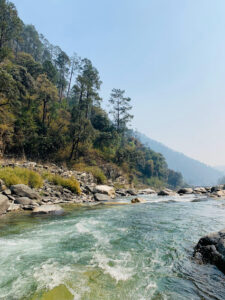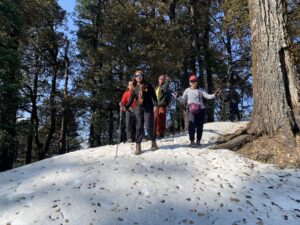- Overview
- Trip Outline
- Trip Inclusions
- Trip Exclusions
- Gallery
- Reviews
- Book Now
- FAQ
The Trek
Dodital trek is popular among trekkers for the pristine beauty of the Dodital lake, nestled among mountains at an altitude of 3310 mts above sea level. It is a beautiful alpine lake in the Garhwal Himalayas. It is supposedly the birth place of Lord Ganesha and there is a temple which is dedicated to Lord Ganesha.
The trek to this iconic lake takes you through dense Oak, Rhododendron and Maple
forests. During the trek experience the mesmerizing views of Dhauladhar and Greater
Himalayan Ranges. Get a chance to camp on meadows under the clear night sky
surrounded by mighty peaks.
The Area
Dodital lies very close to the Uttarkashi in the Gangotri valley in the Garhwal section of Uttrakhand. The Char Dham lies in Uttarakhand and is thus called Dev Bhoomi (Gods abode).This area is a major Hindu tourist/pilgrim destination. The native language is Garhwali and the people are often referred as Pahadi (Mountain folk).
Expected Weather
• Chances of rain / hail – Unlikely
• Snow on trail – Possible
• Temperatures – Afternoons around 10 degrees Celsius;
Nights around 0 to 1 degrees Celsius at higher camps
How are we making your experience better?
- We maintain a ratio of 1 trained staff per 5 trekkers.
- Our trip leaders are certified Wilderness First Responders and are capable of handling medical emergencies in the wilderness.
- Our guides are trained naturalists and love sharing information about the local flora and fauna and also the culture.
In short we provide a complete all-round outdoor experience!
Day 1: Drive from Dehradun to Agora (2251 mts)
Distance; 160 kms; Drive time: 7 hrs. Overnight stay in a beautiful village homestay.
Day 2: Trek from Agora to Manjhi (2880 mts)
Trek distance: 10 kms; Trek time: 5 hrs. Overnight stay in camps.
Day 3: Trek from Manjhi to Dodital (3024 mts)
Trek distance: 5 kms; Trek time: 3-4 hrs. Overnight stay in camps.
Day 4: Trek from Dodital to Darwa Top (4151 mts) and back
Trek distance: 10 kms (up & down total); Trek time: 6-7 hrs. Overnight stay in camps.
Day 5: Trek from Dodital to Agora (2251 mts)
Trek distance: 15 kms; Trek time: 6 hrs. Overnight stay in Homestay.
Day 6: Drive from Agora to Dehradun
Distance; 160 kms; Drive time: 9 hrs. Trek ends on reaching Dehradun.
• Travel from and to Dehradun on first and last days.
• Complete stay and accommodation during the entire trek.
• All meals starting from evening tea on the first day to breakfast on the last day.
• Rentals for all common gear provided to you.
• Forest Entry Permission charges & Guide and expertise charges.
• 5% GST
• Meals or drinks purchased by participants during the travel or trek.
• Rentals for personal clothing.
• Trek Insurance (Optional)
• Flight/Train/Bus ticket till Dehradun.
• Backpack offloading charges. Trekkers can opt for a porterage service at ₹400/day.
On Day 1 we start at 09:00AM. We suggest you book your arrival such that you reach Dehradun/Rishikesh before 09:00AM on Day 1. If you're coming via flight, you may want to land the previous night. If you don't want to stay a night in Dehradun/ Rishikesh you may arrive on Day 1 of the trek itself. The overnight Nandadevi train starts from Delhi and reaches Dehradun at 05:00AM/ 06:00AM. (Dehradun to Rishikesh by road is approximately 1 hr 15 mins.) Similarly for departure, on the last day we will be reaching Dehradun by dinner time. If you're booking a flight for your departure we suggest you book a flight for the next day. If you don't want to stay a night and want to leave on the last day itself, the overnight Nandadevi train starts from Dehradun at 11:00PM.
Yes, this trek is ideal for first timers.
A certified trek leader, a guide, cook & porters will accompany you during the trek
You can prepare for the trek with a combination of Cardio & Strength activities
2-3 kms slow jog OR 5-6 kms of brisk walking OR 10 kms cycling. Pace is not important, consistency is important (non-stop jogging/running/cycling)
Squats 15 x 3, Lunges 15 x 3, Calf raises 15 x 3
All of the above at least 4 times a week
Climbing stairs 15-20 floors with backpack (At Least once a week)
Yes, you are ideally expected to carry your backpack. But you do have an option of offloading your bags on a mule for an additional cost. The cost will be INR 400/ per day per bag (weight not exceeding 8kg). One is expected to inform us about offloading 1 week prior to the trek.
1. Good Sturdy Backpack: Prefer a trekking pack over a backpacking one. The size of the backpack depends upon the participant. Normally for a 5-6 day trek a 40-50 litre pack should suffice.
2. Shoes: Any waterproof trek (not hike) shoe would be ideal.
3. Socks: 3 pair cottons and 3 pairs of woollens.
4. Trek pants (ideally water resistant): Get two trek pants on this trek, both should be slightly thick, winter trekking pants. If you don’t have a trek pants, you can replace it with thick Gym track pants too. Don’t trek in jeans/ pants.
5. T-shirt/ Base layer: Get 2 T-shirts/ trekking base layer on the trek, both of which should be thick and full sleeve. Avoid cotton and prefer dry fit.
6. Fleece/ Sweater/Good quality Hoodie: Get 1 fleece jacket or sweater. Fleece is preferred over sweater as it is lightweight and easy to carry. Sweaters and Jackets can be heavier than Fleece for the warmth they offer.
7. Down/ Padded Jacket: Down/ Padded jacket (Up to -10 degrees capacity) is a must for winter treks. If you are not sure about the quality of your padded/ down jacket, get two fleeces.
8. Thick track pants for camp: These are specifically for cold evenings at the campsite. This can be ignored if you are comfortable wearing your thick trekking pants in the camp.
9. Thermals: 1 pair. We wear thermals only upon reaching the campsite not while trekking. For treks in December, January and February, trekkers who are doubtful about their layers can get 2 lower thermals.
10. Windproof Jacket: All rain proof can be used as wind proofs. Required as an additional layer during trekking in windy conditions. Avoid if you have a rain proof jacket.
11. Rainwear:
Option 1 – Rain set: One Waterproof jacket (3000 mm waterproofing), Rain proof pants and Bag cover
Option 2 – Poncho: Covers your body and bag completely.
We recommend Option 1 as poncho makes trekking difficult.
12. Woolen Cap/ Balaclava – 1: To cover your ears and head. Get a thick fleece lining one for winter treks
13. Neck Warmer/ Scarf - 1: For evenings.
14. Gloves: 2 gloves out of which 1 can be water proof and one woollen. The waterproof one has to ideally be padded and a size larger than you normally use so that you can wear both your gloves together if required.
15. Suncap – 1
16. Sunglasses – 1
17. Toiletries – Also include sunscreen, moisturizer and lip-cream
18. Headlamp/ Torch (Prefer a head lamp) -1
19. Two water bottles (1 litre each) – One can be a thermos flask.
20. Camp shoes/ Flip flops for camp
21. Plastic covers for inside the backpack to keep your clothes dry
22. Daypack – Required if you have a summit days climb. Preferably one that can be compressed.
23. Documents: 2 passport sized photograph, Address and Photo proof (Driving License or Aadhaar card), Doctor’s medical certificate saying that you are fit for the trek. We reserve the right to not take you on the trek, if you fail to produce this.
24. Trekking pole
We’ve been organizing treks for over five years and have had many female trekkers trek with us. In fact, a lot of them come solo for treks. There has never been a complaint about the atmosphere of a trek, about other trekkers or our professionalism. They have all been kind enough to leave a review.
You will be sleeping in twos or threes in your tents in sleeping bags. The sleeping bags are snug and comfortable. We will be providing inflatable pillows.
No. Guests are expected to carry their own power banks.
In all the camps where the accommodation is in tea houses/ home stays, there will be proper toilets. The toilets are mostly western, in case if they‘re Indian, then we try to provide a toilet seat most of the times.
On the day of camping, we will have toilet tents (with a dry pit toilet), the most hygienic way of answering nature’s call.
A dry pit toilet is an eco-friendly sanitation solution featuring a pit dug into the ground, topped with a toilet seat and a wrought iron stand. Near the toilet, a pile of mud, sand, or coco peat is provided for covering waste after use, facilitating rapid breakdown of fecal matter due to increased microbial activity. This method eliminates the need for water, thereby preventing contamination of nearby water sources, as water toilets are prohibited at campsites.
While toilet paper is available, please use it sparingly to avoid overloading the pit, which can take years to decompose. Please refrain from using wet wipes as they are not biodegradable or use biodegradable wipes.
Through the trek, there are no bathing facilities at campsites. Trekkers often take advantage of running streams to freshen themselves up.
Meals will be provided by us. However you may carry snack items to much on like dry fruits, biscuits, chocolates, protein bars, or nuts.
Most wild animals are naturally wary of human activity and prefer to stay in more remote, quieter parts of their habitat. Here’s why wild animals typically do not approach camps.
The common perception is that alcohol makes you feel warmer, however it also dehydrates you & dehydration can be fatal while trekking. Hence consumption of alcohol is prohibited. Smoking in camps is not allowed.
If you cancel –
– 60 days before the trip: we can process a complete refund minus minimum processing charges.
– Between 30-45 days before the trip: you will be refunded 50% of the trek fee.
– Within 30 days before the trek starts: No refund.
– If your spot is replaced in a full batch: we will process a complete refund after canceling minute operational charges. (For fixed departures only)




There are no reviews yet.